Why Antioxidants?
Optimize nutrient levels prior to surgery to maximize wound healing.
Antioxidants in the diet have some remarkable benefits and valuable properties that play an irreplaceable role in the maintenance of periodontal health, bone physiology and soft tissue wound healing.

Why Antioxidants
Several factors can impair wound healing such as oxygenation defects, aging, and overall stress. Furthermore, a number of other factors such as infection found in periodontal disease, diabetes, alcohol overuse, smoking and impaired nutritional status may also result in deficient wound healing. Growing evidence suggests that reactive oxygen species(ROS) are crucial regulators of several phases of wound healing. In recent years, ROS has gained attention because of their central role to the progression of many inflammatory diseases.1 Excessive production of ROS or impaired ROS detoxification causes oxidative damage, which has been shown to be a main cause of non-healing chronic wounds and tissue degeneration.2, 3
In simple terms, ROS are oxygen free radicals and other non-radical oxygen derivatives involved in tissue degradation.4 They are produced during normal cellular metabolism by cells in most tissues. To combat oxidative stress, all cells in the body are equipped with an intrinsic store of molecules known as “antioxidants” which prevents tissue damage.5 When this balance is shifted however, high levels and activity of ROS causes DNA damage, protein damage, and lipid peroxidation. This in term leads to impaired wound healing and many long-term chronic degenerative diseases and whole body tissue inflammation, are linked to common diseases such as dementia and various cancers.
Unfortunately a large percentage of the population today suffers from vitamin and mineral deficiencies which help increase antioxidant levels. In particular, absorption of vitamins and minerals is decreased with poor diet, aging, diabetics, those treated with immunosuppressive drugs, as well as chemo- or radiotherapy. Furthermore, alcohol consumption,6 smoking7 and hypertension8 are all associated with higher rates of vitamin deficiencies and/or oxidative stress and its associated with oral health diseases such as periodontitis.
Supplementation with low molecular weight antioxidants and ROS-detoxifying enzymes has become vital for many individuals with deficiencies.9 There are 2 categories of antioxidants including 1) enzymatic antioxidants such as superoxide dismutase (SOD), catalase (CAT), glutathione peroxidase/reductase, DNA repair enzymes, and various metal ion sequestrators. Secondly, scavenging antioxidants or chain breaking antioxidants such as ascorbic acid (vitamin C), carotenoids (including retinol-vitamin A), uric acid, a-tocopherol (vitamin E), coenzyme Q, and polyphenols (flavenoids) are all potent antioxidants commonly associated with improved wound healing.
An effort toward the maintenance of optimal levels of the aforementioned antioxidants, as well as the overall desire for patients to improve general health, additional supplementation with vitamins and minerals to treat nutritional deficiencies have become routine in modern culture.
DentaMedica® – The science behind dental healing

Antioxidants in the diet have some remarkable benefits and valuable properties that play an irreplaceable role in the maintenance of periodontal health, bone physiology and soft tissue wound healing.
Epidemiological studies from the United States has demonstrated that vitamin deficiencies range dramatically among the population.

As a result, the DentaMedica® Recovery Support Program aims to restore levels in patients prior to dental procedures since failure may occur as a result of any of the above-mentioned deficiencies. Importantly, Vitamin D deficiency in particular has been shown to be linked to a much greater implant failure rate in dentistry.
Add Your Heading Text Here
Essential Vitamins to Promote Healing
Below we highlight the role of many of the vitamins/minerals/supplements found in DentaMedica®’s recovery program.
Zinc
Zinc is an essential trace element (micronutrient) which plays important roles in human physiology. Zinc is a cofactor for many metalloenzymes required for cell membrane repair, cell proliferation, growth and immune system function. The pathological effects of zinc deficiency include the occurrence of skin lesions, growth retardation, impaired immune function and compromised would healing.10
Vitamin C
Vitamin C plays a significant role in periodontal health and maintenance. Vitamin C is a potent antioxidant which has a primary function as a radical scavenger11 and is required for the synthesis of collagen hydroxylation in humans.11 It also contributes to immune defense by supporting various cellular functions of both the innate and adaptive immune system. Vitamin C supports epithelial barrier function against pathogens and promotes the oxidant scavenging activity of the soft tissues, thereby potentially protecting against environmental oxidative stress by ultimately killing the microbia. Vitamin C deficiency results in impaired immunity and higher susceptibility to infections. Furthermore, infections significantly impact on vitamin C levels due to enhanced inflammation and metabolic requirements.12
Vitamin C is rapidly depleted and oxidized within the extracellular fluids during oxidative stress.13 It is especially important for bone forming osteoblasts to lay new bone matrix. Sources of vitamin C include natural fruits and vegetables such as gooseberry, broccoli, kiwi, grapefruits, citrus fruits, cauliflower, strawberries, pineapple, cherries, and potatoes. It is recommended to eat high levels prior to dental surgery. Additionally, Vitamin C is also found in high doses in both the morning and evening formulas of DentaMedica’s recovery support program.
Flavonoids
Flavonoids are polyphenolic compounds found in plants known to contain potent antioxidant, anti-inflammatory, anti-allergic, antiplatelet, and antitumor activities.14 It also has a positive effects against diverse diseases such as cancer, neurodegenerative or cardiovascular disease.15 There exists a potent synergistic relationship between flavonoids and vitamin C as a powerful antioxidant combo.16 Flavonoids also help to protect blood vessels from rupture or leakage. A popular source of flavonoids is green tea. Other sources include parsley, onions, blueberries and other berries, bananas, citrus fruits, Ginkgo biloba, red wine, sea buckthorns, and dark chocolates (with a cocoa content of >70%).
Vitamin D
Vitamin D is an extremely important vitamin for bone mentalism and is well known for its role in calcium homeostasis as previously mentioned. It also acts as an anti-inflammatory agent because it acts directly on immune cell cytokine expression.17 Unfortunately it is majorly synthesized in the human body following sun exposure. With the increasing population being interior and the number of desk jobs continuously rising, it is one of the most prevalent vitamin deficiencies known to man worldwide. Unfortunately, foods in general have extremely low levels and supplementation therefore becomes a requirement when deficiency is present.
B-Vitamins
B-Vitamins: Vitamin B1 (also called thiamin), Vitamin B2 (also called riboflavin) are both vitamins that help convert food into energy. Vitamin B1 is a hydrosoluble vitamin that plays a role in several biological processes mainly in glucose metabolism.18 Vitamin B2 helps maintain eyesight. Vitamin B12 helps regulate the nervous system and plays a role in growth and red blood cell formation. It is found primarily in meat and dairy product. Vitamin B6 (also called pyridoxine) helps the body fight infections. It is primarily found in chickpeas, tuna, salmon, whole grains and cereals, beef liver, ground beef and chicken breast. Biotin is a water-soluble vitamin that’s a part of the vitamin B family that also helps convert certain nutrients into energy. It also plays an important role in the health of your hair, skin, and nails.
Carotenoids
Carotenoids are a set of naturally colored pigments. Vitamin A is one of the major carotenoids. They are antioxidant in nature and have protective effects on vitamins C and E. They also show synergistic effects by scavenging reactive nitrogen species. b-Carotene is the main source of vitamin A in the diet. Carotenoids have a significant influence on other antioxidants, and hence they are considered vital in antioxidant defense mechanisms. Sources include tomatoes, apricots, guavas, watermelons, papayas, and pink grapefruits. DentaMedica® is highly supplemented with Vitamin A.
Magnesium
Magnesium is a cofactor in more than 300 enzyme systems that regulate diverse biochemical reactions in the body, including protein synthesis, muscle and nerve function, blood glucose control, and blood pressure regulation.19, 20 Magnesium is required for energy production, oxidative phosphorylation, and glycolysis. It contributes to the structural development of bone and is required for the synthesis of DNA, RNA, and the antioxidant glutathione. Magnesium also plays a role in the active transport of calcium and potassium ions across cell membranes. Mostly consumed in nuts, almonds, cashews, peanuts and spinach.20
Manganese
Manganese is predominantly stored in the bones, liver, kidney, and pancreas and provides a role in the formation of connective tissue, bones, blood-clotting factors.
Selenium
Selenium is yet another powerful antioxidant found in the DentaMedica® Recovery Kit that fights oxidative stress and helps defend the body from chronic diseases.
In addition to the aforementioned antioxidants, there are a number of other micronutrients and macronutrients that play a significant role in bone tissue homeostasis, periodontal health, disease prevention and immune system health. DentaMedica® Recovery kit provides the source foods containing antioxidants as their major beneficial component in the prevention of disease and implemented wound healing.

In addition to the aforementioned antioxidants, there are a number of other micronutrients and macronutrients, which may play a significant role in periodontal health and disease prevention. DentaMedica® Recovery kit provides the source foods containing antioxidants as their major beneficial component in the prevention of disease and implemented wound healing.

In addition to the aforementioned antioxidants, there are a number of other micronutrients and macronutrients, which may play a significant role in periodontal health and disease prevention. DentaMedica® Recovery kit provides the source foods containing antioxidants as their major beneficial component in the prevention of disease and implemented wound healing.
References
- Mittal M, Siddiqui MR, Tran K, Reddy SP, Malik ABJA, signaling r. Reactive oxygen species in inflammation and tissue injury. 2014;20:1126-1167.
- Cano Sanchez M, Lancel S, Boulanger E, Neviere R. Targeting Oxidative Stress and Mitochondrial Dysfunction in the Treatment of Impaired Wound Healing: A Systematic Review. Antioxidants (Basel, Switzerland) 2018;7.
- Wei W, Liu Q, Tan Y, Liu L, Li X, Cai L. Oxidative stress, diabetes, and diabetic complications. Hemoglobin 2009;33:370-377.
- Lushchak VIJC-bi. Free radicals, reactive oxygen species, oxidative stress and its classification. 2014;224:164-175.
- Sies HJEPT, Integration. Oxidative stress: oxidants and antioxidants. 1997;82:291-295.
- Park JB, Han K, Park YG, Ko YJJop. Association between alcohol consumption and periodontal disease: the 2008 to 2010 Korea National Health and Nutrition Examination Survey. 2014;85:1521-1528.
- Jang A-Y, Lee J-K, Shin J-Y, Lee H-YJKjofm. Association between smoking and periodontal disease in Korean adults: the fifth Korea National Health and Nutrition Examination survey (2010 and 2012). 2016;37:117.
- Ahn YB, Shin MS, Byun JS, Kim HDJJocp. The association of hypertension with periodontitis is highlighted in female adults: results from the Fourth Korea National Health and Nutrition Examination Survey. 2015;42:998-1005.
- Schafer M, Werner S. Oxidative stress in normal and impaired wound repair. Pharmacological research 2008;58:165-171.
- Lin PH, Sermersheim M, Li H, Lee PHU, Steinberg SM, Ma J. Zinc in Wound Healing Modulation. Nutrients 2017;10.
- Wilson JXJARN. Regulation of vitamin C transport. 2005;25:105-125.
- Carr AC, Maggini S. Vitamin C and Immune Function. Nutrients 2017;9.
- Frei B, England L, Ames BNJPotNAoS. Ascorbate is an outstanding antioxidant in human blood plasma. 1989;86:6377-6381.
- Vinson JA, Jang JJJomf. In vitro and in vivo lipoprotein antioxidant effect of a citrus extract and ascorbic acid on normal and hypercholesterolemic human subjects. 2001;4:187-192.
- Faggio C, Sureda A, Morabito S, et al. Flavonoids and platelet aggregation: A brief review. European journal of pharmacology 2017;807:91-101.
- Tapas A, Sakarkar D, Kakde RJTJPR. A review of flavonoids as nutraceuticals. 2008;7:1089-1099.
- Anand N, Chandrasekaran S, Rajput NSJJoISoP. Vitamin D and periodontal health: Current concepts. 2013;17:302.
- Polegato BF, Pereira AG, Azevedo PS, et al. Role of Thiamin in Health and Disease. Nutrition in clinical practice :official publication of the American Society for Parenteral and Enteral Nutrition 2019.


